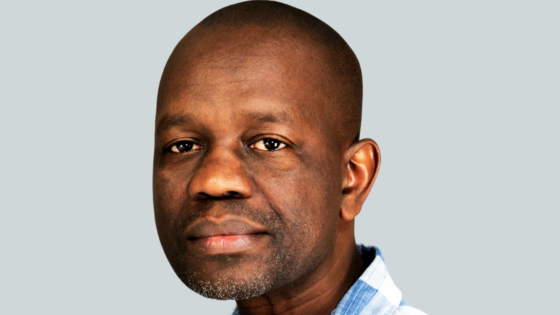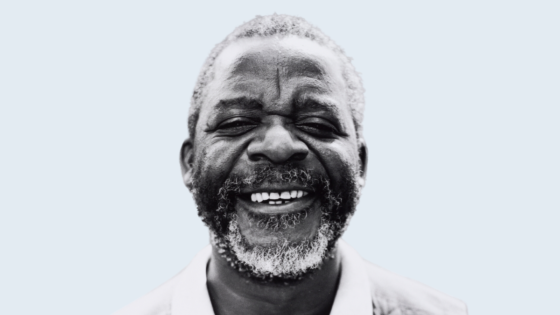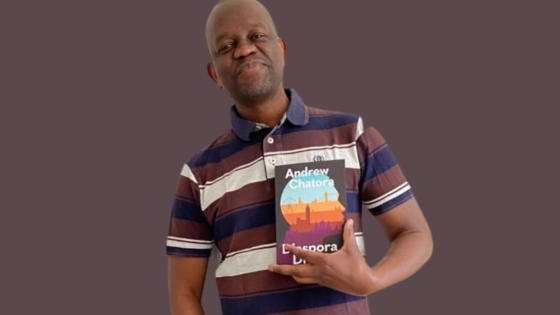“Kundai loses it all and his subsequent charmed incantations and chants while in an English madhouse, are the most revealing part of this novel. As a result, Diaspora Dreams could be of interest to those who study the male psyche and manhood. The losing black male is still a dark area, rich with distances to be travelled and depths to be probed.”
Memory Chirere – University of Zimbabwe
Prominent Harare bookseller in Zimbabwe Book Fantastics recently had the chance to catch up with Diaspora Dreams Zimbabwean born author Andrew Chatora resident in England: Excerpts of the interview below:
- Book Fantastics (BF): Thanks for this latest addition to the documentation of our living and dying in the dispersion season. I don’t know if you have any idea if this dispersion season will ever end. What pushed you to weave this beautiful piece when we all thought everything to be written of the Zimbabwean diaspora in particular (and African diaspora in general) is over?
Andrew Chatora (Chatora): Diaspora Dreams can best be understood within the globalisation prism where as cliched as it may sound but increasingly, the world has become compressed in one global village in (Marshall McLuhan’s) parlance, and I don’t see our journey from the periphery into the centre ending any time soon. Diaspora Dreams is our story, the story of every migrant, regardless of gender, ethnicity, creed or colour and thus for the sake of presenting an authentic narrative, the story had to be told through the portrait of Kundai, the protagonist a Zimbabwean man living in England. Diaspora Dreams was also borne out of the tragic death of George Floyd, a black man murdered in Minnesota, Minneapolis, America by the police in May 2020, in a clear case of heavy handedness, callous police brutality. As fellow immigrants in the diaspora, we are all George Floyd! And his story resonates with our own personal stories, our lived culture.
There are also other variables to Diaspora Dreams. I reckon there was a lacuna both on the Zimbabwean and African diaspora especially in terms of a narrative which recounted what it means to teach English to English kids when you’re from a former colony, as is Kundai’s experience as a black English Teacher in posh Oxfordshire County in England. In fact, one reviewer Memory Chirere of the University of Zimbabwe reviewed Diaspora Dreams as such and reckoned this could be the strongest aspect of the book.
In addition, Diaspora Dreams subverts the often-bandied notion of toxic masculinity through the portrait of Kundai an impotent, emasculated hapless man at the mercy of the wily hands and manipulation of his various paramours. Masculinity is flipped on its head as Kundai recounts work place bullying at the hands of women, whilst he is also on the receiving end of marital violence and trauma from his partners.
Moreso, mental health illness in men is a subject rarely touched on both in Zimbabwean and African literature and as some reviewers have asserted, Diaspora Dreams marks a niche by breaking new grounds in this area tackling mental illness of both Kundai and his wife Kay. So Chatora has made the unspeakable talked about through Literature. Another first!

- BF: I’m fascinated by marital relationships as a reader. I open my eyes and try to focus differently when a writer focuses on such. With reference to Kundai and Kay’s squabbles, Mbuya Mafirakureva’s interference, Relate Counselling and probably the courts in their attempts to save the dying marriage do you think there is hope in the intactness of modern families especially in the diaspora?
Chatora: Lest I be dubbed a pessimist, but the unfolding realities obtaining in the diaspora are that modern marriages are in a constant state of flux and crisis, thus vulnerable and ready to disintegrate. When we moved into these new lands, we were wet behind the ears without any attendant social and family support structures to cushion us from a new culture, work related stress and the daily grind pressures which sadly impacted and continues to have a negative backlash on marriages. Marriages in the diaspora reminds me of Mungoshi’s inongova njake-njake phrase, as couples’ bicker and squabble over trivia and in the end the children suffer when mummy and daddy go their separate ways.
- BF: I read Diaspora Dreams at a time I’ve just finished Ignatius Mabasa’s Ziso reZongororo whose main character is struggling with memories of childhood from a disjointed family. In as much as Mabasa’s book is recounted from a child’s perspective, I see it conversing with Kundai’s tale as a father yearning to show off some love to his children during and after divorce. My question then is what do you think should be done to mitigate some unnecessary and unreasonable antagonism from divorcing adults which has a negative impact on children?
Chatora: Beautiful question! Sit down and talk together as adults. Push those misplaced inflated egos aside and converse rationally, if not for you two anymore, then for the sake of the off spring in the marriage, children our future. Now, I am not naïve and do realise that sometimes things do not work out with the best of intentions in the world of relationships and people have to part ways. But even if that’s the case, then the children have a right to continue to have a positive and meaningful relationship with both parents, unlike the toxicity witnessed in Diaspora Dreams whereby Kay turns the children against their father. This is nigh despicable and should never be condoned.
- BF: Now the story is filled with a beautiful nostalgic tinge when the narrator was hopeful and participating in initiatives meant to better the environment and living conditions. He is a man of many beautiful jackets: a contributor to local newspapers, a participant at ZIBF, a student activist. How did the writing process work as a reconnecting process with Zimbabwe and the past that now seemingly look beautiful to you as a writer?
Chatora: I must say, writing has certainly worked well as a much-needed antidote to me, enabling me to reconnect with the multifaceted nostalgic Zimbabwe of yester-year particularly for one living so far away from home. In a way, writing has enabled me to live vicariously through my characters such as Diaspora Dreams protagonist Kundai. Perhaps it’s no coincidence therefore some of the harshest criticism on the book has been from those who claim they saw Kundai in me particularly those readers who knows me personally, (a chuckle…).
But yes, there’s that reconnection that writing about my beautiful homeland Zimbabwe affords me. Writing Diaspora Dreams for instance provided that panacea for me to bond with my native Zimbabwe heritage, kurukuvhute – where it all started. You will see for instance my searing passion jumping out from the passages as I recount and reference places, I like for instance growing up in the dusty streets of Dangamvura, Mutare, writing prodigiously to the local newspaper: The Manica Post, being a student activist at the University of Zimbabwe, my incarceration at Avondale police station, ZIBF forays, Mutare museum poetry reading sessions, all this of course is reflected through my central character Kundai. And no, I am not a misogynist as some readers have charged pointing accusatory fingers at the portrait of Kundai and his difficult relationships with women.
- BF: Still on relationships, Kundai remarked “One survival trick I learnt with white people in England was to play the politics of survival; sometimes you had to act the fool and know when to say something or keep your mouth shut”. Shed more light on the sometimes-tumultuous space of race relations in the global north. Looking at paradoxical reactions from the whites in the book and black reaction to white supremacy do you have hope in better racial relations in Europe and the globe?
Chatora: Race relations is considered divisive and touchy a subject by many thus I saw some deliberate smears by certain sections of some readers who possibly felt uncomfortable with Diaspora Dreams content and therefore sought to detract from the race relations subject matter it covers by peddling an alternative, facile narrative that the book is misogynistic and not helpful to the Feminist movement as if writers write to ingratiate themselves to particular or sectarian organisations!
Now, this may appear a winding response to your question but let me come to the crux of the matter in a minute. Post-Brexit Britain has increasingly become toxic and racist, with a binary dichotomous us versus them society created and sadly, foreigners, immigrants have become the object of racist vitriol, relentless scapegoating, needless bashing and attacks in Britain, all the while fanned by a predominantly right wing, xenophobic, gutter British press. Much as I would want to appear optimistic about race relations in Britain, I have to be honest, I can’t. Unfolding events in Britain today points to an increasingly polarised nation along the racial divide. And let’s get this straight Folks, this is not me, playing victim hood here.
Immigrants continue to experience racist micro-aggressions in England, particularly at the workplace and in their mundane private lives. A day after the Brexit referendum results, a white friend of mine, a fellow Teacher from Poland was brazenly told ‘go back home, you’re not wanted here,’ by her students. So, to come back to your question, summing up, I doubt things will become any better soon, and this is where narratives like Diaspora Dreams become relevant as they call out the institutionalised racism in Britain and its establishment. I doubt I need to even go far to elucidate some of my claims and observations here, the horrendous maligning and ‘lynching’ of Megan Markle by the rabid right wing British press is but a tip of the proverbial iceberg for what I’m saying here.
The recent Euro 21 aftermaths racist tirade directed against black England team players has been an ugly development in contemporary Britain, with all its cringeworthy negative headlines. The three England black players who missed the penalties have borne the brunt of a vicious racist vitriol at the hands of trolls and unashamed bigots. In America they rejected Trumpism and white supremacy in the last elections and I hope our day will come soon in England through democratic means to rid ourselves of this vermin that is Toryism and its servile acolytes.
This article was first published by Book Fantastics and it is published here with permission of Book Fantastics and the writer.
Author Bio:
Andrew Chatora writes prose and polemical articles and hails from Zimbabwe. His writing is steeped in migrant experiences, and he explores themes of belonging, identity politics, citizenship, nationhood, the black experience and the global politics of inequality inter-alia. Diaspora Dreams is his debut novella, published by Kharis Publishing in the US, an imprint of KHARIS MEDIA LLC. Andrew’s second novel Where the Heart Is, will be published on November 2021.











